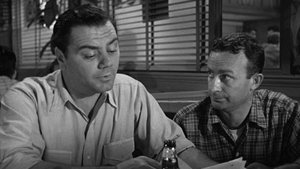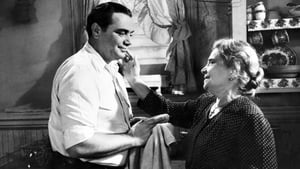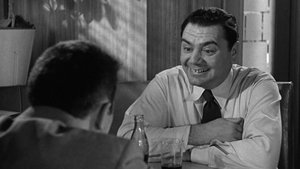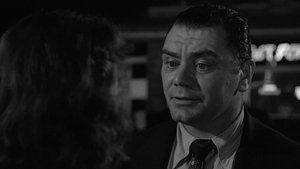Contact: info@alwanfilm.com
Video Sources 0 Views
- Watch trailer
- Marty

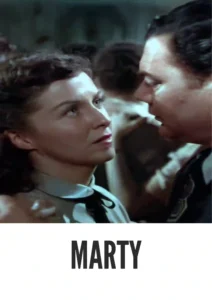
Synopsis
Table of Contents
ToggleCelebrating Love and Loneliness: Marty 1955 Colorized Review – A Heartfelt Review of a Timeless Classic

Introduction
In the landscape of old films, few movies capture the essence of human connection as poignantly as Marty 1955. This touching drama, directed by Delbert Mann, has stood the test of time with its honest portrayal of love, loneliness, and the search for happiness. Now, with the release of its early colored version, audiences have the opportunity to rediscover this cinematic gem in a whole new light. In this review, we delve into the significance of Marty 1955’s early colored version and its impact on the world of cinema.
Check The Full Colorized Movies List
Check Our Colorized Movies Trailer Channel
Understanding Marty 1955 Colorized: Director, Cast, and Genre
Directed by Delbert Mann, Marty 1955 beautifully captures the director’s vision of intimate storytelling and raw emotional depth. The film features a stellar cast, including Ernest Borgnine in the titular role of Marty, alongside Betsy Blair as Clara, whose performances breathe life into the characters with remarkable authenticity. As a classic example of the romantic drama genre, Marty 1955 explores themes of self-discovery, societal pressures, and the transformative power of love.
Exploring the World of Marty 1955 Colorized: Plot and Characters
Set in the working-class neighborhoods of New York City, Marty 1955 follows the story of Marty Piletti, a lonely butcher who struggles to find companionship in a world consumed by social expectations. When Marty meets Clara, a shy schoolteacher facing her own struggles, the two form a deep connection that challenges their perceptions of love and happiness. As their relationship blossoms, Marty must confront his own insecurities and fears, leading to a poignant and heartfelt exploration of the human condition.
The Art of Film Colorization
Film colorization is a technique that has evolved over the years, allowing filmmakers to add color to black and white films and breathe new life into classic movies. While purists may argue against colorization, it offers a fresh perspective on beloved films, allowing viewers to experience them in a different light. The process of colorization involves digitally adding color to each frame of the original black and white film, carefully selecting hues and tones to recreate the look and feel of the original scenes. When done effectively, colorization can enhance the visual appeal of a film and introduce it to new audiences who may be more accustomed to color cinema.
Early Colored Films: A Brief History
The practice of colorizing films dates back to the early days of cinema, with studios experimenting with various techniques to add color to black and white films. In the early 20th century, hand-tinting was commonly used to add color to silent films, with artists meticulously painting each frame to achieve the desired effect. As technology advanced, colorization techniques became more sophisticated, allowing for the creation of vibrant and lifelike colors in black and white films. Today, digital colorization has become the standard method for adding color to classic films, with advanced software and techniques making it possible to achieve stunning results.
Marty 1955 and Its Early Colored Version
The decision to release Marty 1955 in a colorized format was met with both excitement and skepticism. While some welcomed the opportunity to see the film in color, others questioned the need to tamper with a classic. However, the early colored version of Marty 1955 offers a fresh perspective on the film’s iconic visuals, adding new depth and dimension to the viewing experience. By carefully selecting colors that complement the film’s intimate atmosphere, the colorized version preserves the mood and emotion of the original while introducing it to a new generation of viewers.
The Debate Over Film Colorization
The debate over film colorization remains contentious, with supporters praising its ability to breathe new life into classic films, while detractors argue that it detracts from the original artistic vision. Proponents of colorization argue that it can make older films more accessible to modern audiences, who may be less inclined to watch black and white films. They also point out that colorization can enhance the visual appeal of a film and make it more immersive for viewers. However, opponents argue that colorization can alter the intended look and feel of a film, robbing it of its original charm and authenticity. They also contend that colorization can be a form of revisionism, altering the historical record and disrespecting the legacy of filmmakers who created their works in black and white.
Examining Marty 1955 as an Early Colored Film
In analyzing Marty 1955 as an early colored film, it’s essential to consider how colorization enhances or detracts from the viewing experience. While the addition of color may offer a fresh perspective on the film’s visuals, it’s crucial to preserve the integrity of the original black and white version. In the case of Marty 1955, the early colored version succeeds in enhancing the film’s intimate atmosphere, adding warmth and depth to the characters and settings. By carefully selecting colors that evoke the mood and emotion of the original, the colorized version preserves the integrity of the film while introducing it to new audiences.
Influence and Legacy: Marty 1955 Colorized’s Impact on Cinema
Marty 1955 has left an indelible mark on the cinematic landscape, influencing countless filmmakers and inspiring generations of cinephiles. Its early colored version serves as a testament to the enduring legacy of romantic drama and the timeless appeal of classic cinema. By embracing colorization, Marty 1955 continues to captivate audiences with its heartfelt storytelling and unforgettable characters, ensuring its place in the pantheon of cinematic classics for years to come.
Director’s Cinematic Legacy: Beyond Marty 1955 Colorized
Delbert Mann’s influence extends far beyond Marty 1955, with the director leaving an indelible mark on the world of cinema. His sensitive portrayal of human emotion and nuanced storytelling have cemented his status as one of the most iconic directors of the romantic drama genre. Mann’s legacy lives on in the countless filmmakers who have been inspired by his work, ensuring that his contributions to cinema will never be forgotten.
Themes Explored in Marty 1955 Colorized
From its exploration of loneliness and longing to its celebration of love and companionship, Marty 1955 delves into a myriad of themes that resonate with audiences of all generations. Its timeless appeal lies in its ability to capture the universal human experience, offering a poignant reminder of the power of connection in an often isolating world. The film’s exploration of self-discovery and personal fulfillment continues to resonate with viewers, inviting them to reflect on their own relationships and aspirations.
Reception and Controversy Surrounding Marty 1955 Colorized
Upon its release, Marty 1955 received critical acclaim for its heartfelt storytelling and authentic performances. However, its early colored version sparked controversy among fans and critics alike, with opinions divided on the merits of colorization. While some praised the colorized version for enhancing the film’s emotional impact, others argued that it detracted from the original black and white version. Despite the debate, Marty 1955 remains a beloved classic of the romantic drama genre, cherished by cinephiles for its timeless appeal and enduring legacy.
Where to Watch Marty 1955 Colorized Online
For those eager to experience Marty 1955 in its early colored version, the film is available on popular streaming platforms, offering viewers the opportunity to immerse themselves in the world of classic cinema from the comfort of their own homes. Whether seen in its original black and white format or in vibrant color, Marty 1955 continues to captivate audiences with its heartfelt storytelling and unforgettable characters, ensuring its place in the annals of cinematic history.
FAQs About Marty 1955 Colorized
Q: Is Marty 1955 based on a true story?
A: Marty 1955 is a work of fiction, although it draws inspiration from real-life experiences and human emotions. Director Delbert Mann crafted a heartfelt story that resonates with audiences of all generations, capturing the universal human experience with remarkable authenticity.
Q: What makes Marty 1955 stand out from other romantic dramas?
A: Marty 1955 distinguishes itself through its honest portrayal of love and loneliness, as well as its authentic performances and intimate storytelling. Director Delbert Mann’s sensitive direction and the stellar cast bring depth and nuance to the characters, creating a cinematic masterpiece that continues to touch the hearts of viewers.
Q: Does the early colored version of Marty 1955 enhance the viewing experience?
A: While purists may prefer the original black and white version, the early colored version of Marty 1955 offers a fresh perspective on the film’s visuals, adding warmth and depth to the characters and settings. By carefully selecting colors that complement the film’s intimate atmosphere, the colorized version preserves the mood and emotion of the original while introducing it to a new generation of viewers.
Q: What was the critical reception of Marty 1955 upon its release?
A: Marty 1955 received critical acclaim for its heartfelt storytelling and authentic performances, winning the Palme d’Or at the Cannes Film Festival and the Academy Award for Best Picture. The film’s early colored version sparked debate among fans and critics, with opinions divided on the merits of colorization. However, its enduring legacy as a cinematic masterpiece remains undisputed.
Q: Who was involved in the production of Marty 1955?
A: Marty 1955 was directed by Delbert Mann, who brought his unique vision and sensitivity to the film. The cast included Ernest Borgnine in the titular role of Marty, alongside Betsy Blair as Clara, whose performances earned widespread acclaim. Together, they created a timeless classic that continues to resonate with audiences around the world.
Conclusion
In conclusion, Marty 1955 remains a timeless classic of the romantic drama genre, beloved by cinephiles around the world. Its early colored version offers a fresh perspective on the film’s iconic visuals, adding warmth and depth to the characters and settings. Whether seen in its original black and white format or in vibrant color, Marty 1955 continues to captivate audiences with its heartfelt storytelling and unforgettable characters. As a testament to the enduring power of love and human connection, Marty 1955 remains a cinematic masterpiece that will continue to be celebrated for generations to come.
